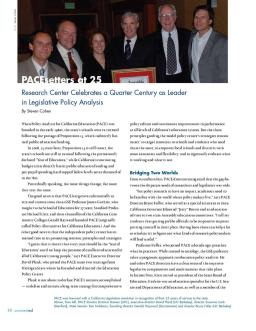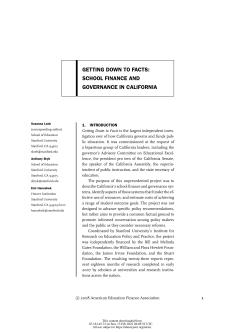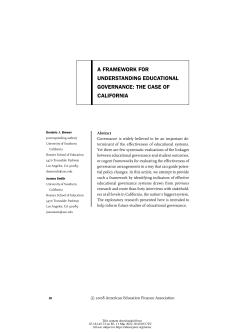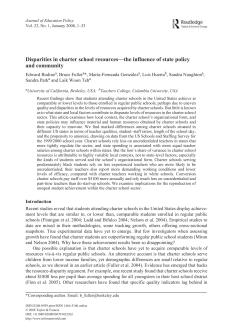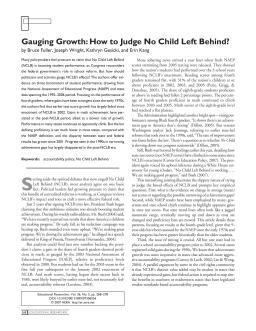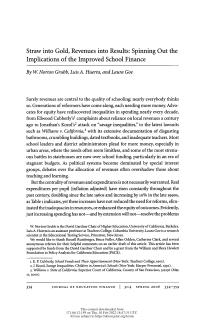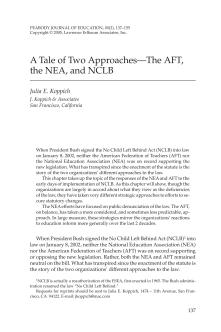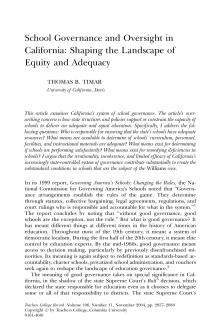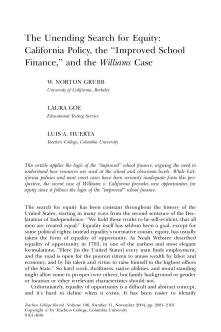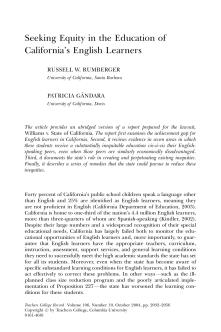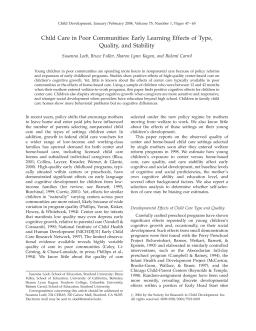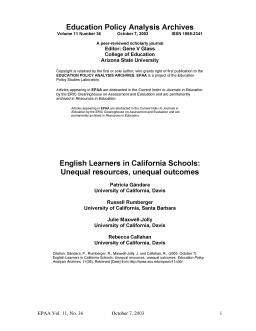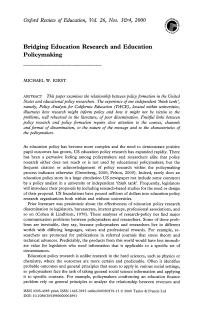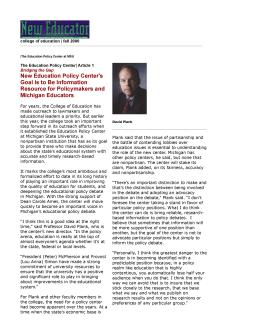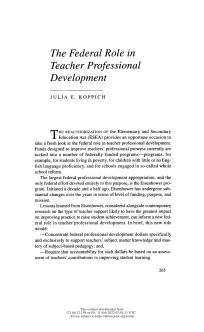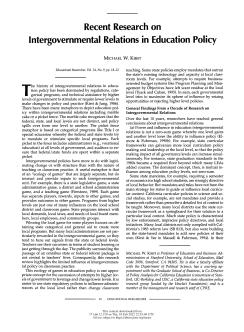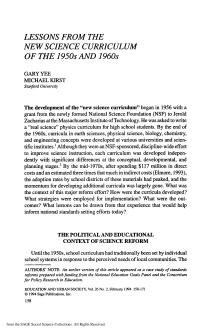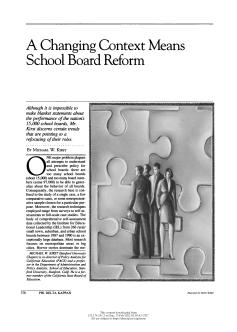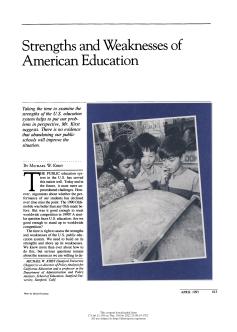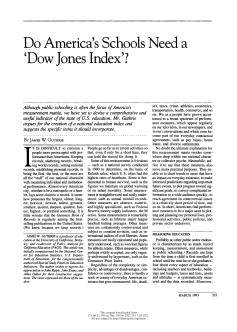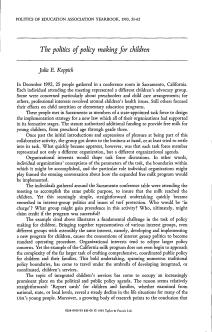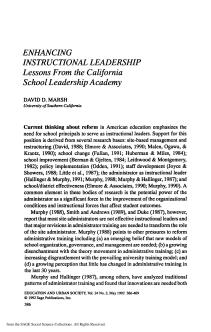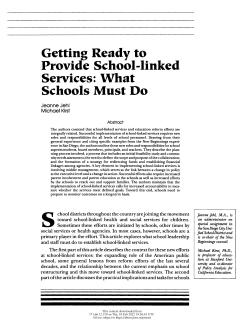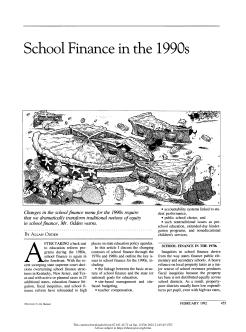Research Center Celebrates a Quarter Century as Leader in Legislative Policy Analysis
Published
Summary
The call for improved education persists annually within PACE, emphasizing the perpetual need for progress. Even with strides made, the organization does not consider its mission accomplished. Guided by three core principles—allocating resources to disadvantaged schools, granting autonomy to local districts, and rigorous evaluation of educational efficacy—PACE remains dedicated to fostering lasting policy reform and enhanced educational performance across California's system. Leveraging experience from Michigan State's Education Policy Center, PACE's leadership continues to drive the...
School Finance and Governance in California
Published
Summary
Getting Down to Facts is an extensive investigation of CA's public education system commissioned by a bipartisan group of CA leaders. The project aimed to describe California's school finance and governance systems, identify obstacles hindering resource utilization, and estimate costs to achieve student outcome goals. The project resulted in 23 reports by scholars, which highlight that the current school finance and governance systems fail to help students achieve state performance goals, particularly those from low-income families. The reports provide a framework for assessing reform options.
The Case of California
Published
Summary
This article highlights the lack of systematic evaluations of the relationship between educational governance and student outcomes. The authors provide a framework for evaluating the effectiveness of governance systems, drawing from previous research and interviews with stakeholders in California's educational system. The aim is to guide potential policy changes and inform future studies of educational governance.
The Influence of State Policy and Community
Published
Summary
Findings show that charter schools in the US perform similarly or worse than public schools due to disparities in resources. State regulation leads to fewer uncredentialed teachers, and more state spending equals more equal teacher salaries. Local context and the type of students served have the greatest impact on resource variance. Charter schools serving Black students rely on less experienced and uncredentialed teachers. Conversion charter schools pay more and have less uncredentialed and part-time teachers than start-up schools, which has implications for unequal student achievement.
How to Judge No Child Left Behind?
Published
Summary
This report analyzes the effects of No Child Left Behind (NCLB) on student performance using three barometers: the National Assessment of Educational Progress (NAEP), state data, and fourth-grade test scores. The authors find that earlier test score growth has largely faded since NCLB's enactment in 2002, and progress made in narrowing achievement gaps in the 1990s has largely disappeared in the post-NCLB era. The report suggests that policymakers need to reconsider the efficacy of NCLB and consider alternative approaches to school reform.
Spinning Out the Implications of the Improved School Finance
Published
Summary
Despite the belief that increased spending leads to better educational outcomes, real expenditures per pupil have doubled since the late 1960s, yet problems in schools persist. An improved school finance approach focuses on effective resources in schools and classrooms that improve valued outcomes, rather than just increasing spending. Clarifying why funding is often wasted and developing new models of connections between revenues, resources, and the results of schooling is essential.
Published
Summary
The National Education Association (NEA) and the American Federation of Teachers (AFT) initially remained neutral on the No Child Left Behind Act (NCLB). Though both organizations have similar criticisms of the law, the AFT has taken a more thoughtful and less predictable approach, while the NEA has focused on public denunciation. However, neither organization has been entirely successful in crafting a policy response to NCLB.
Shaping the Landscape of Equity and Adequacy
Published
Summary
This report focuses on California's school governance system and how it affects schools' ability to provide an adequate and equal education. The author examines who is responsible for ensuring adequate resources, how to assess adequacy, how to determine school performance, and how to address deficiencies. The report argues that California's state-controlled governance system is irrational, incoherent, and limited in efficacy, contributing to substandard school conditions, as seen in the Williams v. California case.
California Policy, the "Improved School Finance," and the Williams Case
Published
Summary
This article applies the logic of the ‘‘improved’’ school finance, arguing the need to understand how resources are used at the school and classroom levels. While California policies and most court cases have been seriously inadequate from this perspective, the recent case of Williams v. California provides new opportunities for equity since it follows the logic of the ‘‘improved’’ school finance.
Published
Summary
This article presents a summary of a report prepared for the Williams v. State of California lawsuit, highlighting the achievement gap for English learners in California and seven areas where they receive an inequitable education compared to their English-speaking peers. It also documents the state's role in perpetuating these inequities and proposes remedies to reduce them.
Early Learning Effects of Type, Quality, and Stability
Published
Summary
This report examines the effects of center care and home-based care on cognitive and social development of young children in poor communities, as well as the impact of caregiver sensitivity and education level. The study used a sample of children whose mothers entered welfare-to-work programs and found positive cognitive effects for children in center care, and stronger cognitive and social development for those with more sensitive and educated caregivers. However, children in family child care homes showed more behavioral problems.
Published
Summary
Modern statecraft in education is giving way to unmodern policy and institutional reform, favoring small and communal schools, alternative networks, and cultural pluralism. Charter schools and preschooling illuminate this shift toward de-centering education, while posing the long-term challenge of balancing particular forms of schooling against the modern impulse to integrate groups via large institutions.
Unequal Resources, Unequal Outcomes
Published
Summary
This article discusses the inequitable education provided to English language learners in California, arguing that there are seven areas where these students receive an inferior education compared to English speakers. That includes having less qualified teachers, inferior curriculum, and being assessed with invalid instruments. The article provides suggestions for addressing these issues.
Published
Summary
This paper examines the relationship between policy formation in the United States and educational policy researchers. The experience of one independent 'think tank', namely PACE, located within universities, illustrates how research might inform policy and how it might not be victim to the problems, well rehearsed in the literature, of poor dissemination. Fruitful links between policy research and policy formation require close attention to the sources, channels, and format of dissemination, to the nature of the message, and to the characteristics of the policymakers.
New Education Policy Center's Goal Is to Be Information Resource for Policymakers and Michigan Educators
Published
Summary
Michigan State University's College of Education has established the nonpartisan Education Policy Center to provide lawmakers and educational leaders with accurate, research-based information to improve the state's educational system. With the support of the university's resources, the center aims to play an important role in deepening the policy debate and bringing about improvements in the system. The center was established due to a lack of systematic communication between researchers and policymakers in Michigan.
Published
Summary
The reauthorization of the Elementary and Secondary Education Act provides an opportunity to reconsider the federal role in teacher professional development. The largest federal professional development fund is the Eisenhower program. Lessons from Eisenhower and contemporary research suggest that federal funds should be focused exclusively on subject matter knowledge and pedagogy and accountability should be based on assessment of student learning. The purpose is to generate discussion on how to more effectively use federal dollars to improve student achievement.
Published
Summary
Intergovernmental relations in education policy are dominated by regulations, programs, and technical assistance. A metaphor called "ecology of games" captures how each level of government maximizes its influence, affecting state and local policy-making. Classroom practice is limitedly influenced by intergovernmental policy, as local demands, taxes, and needs also play a role. State policies are easier to influence administrators than to change teaching. Each level of government tries to maximize its sphere of influence.
Published
Summary
The National Science Foundation granted MIT's Jerold Zacharias in 1956 to develop a real science physics curriculum for high school students. By the 1970s, curricula were developed in various sciences, but each independently with differences in development, planning, and concepts. Despite the $117 million cost, adoption rates peaked and momentum for further curricula development waned. Lessons can be drawn from this experience to inform national standards today.
Published
Summary
The research base for understanding and prescribing policy for school boards is limited due to the large number of boards and members. Common school boards, especially those of small districts, are less researched. To address this, overall trends affecting most boards should be analyzed to determine the need for and direction of school board reform. Waiting for representative data on all boards will delay improvements to policy making. Major changes in school board roles, functions, and operations are necessary due to the interaction of these trends.
Published
Summary
The US public education system has served the nation well, but it must now face unprecedented challenges and worldwide competition. The strengths and weaknesses of the system need to be assessed to build on its strengths and address its weaknesses. However, questions remain about the resources and political will necessary to get the job done.
Published
Summary
The article discusses the importance of parent involvement in education and its effects on student achievement. It suggests that schools need to create a welcoming environment for parents and engage them in meaningful ways, such as through volunteering and decision-making committees. Additionally, the article emphasizes the need for schools to provide information and resources to parents, especially those who are disadvantaged, to ensure that they are equipped to support their children's learning at home.
Published
Summary
The politics of policy making for children is complex due to the multiple interest groups involved. Fragmented policies exacerbate the problem of declining life situations for children. A comprehensive children's policy is needed, but traditional interest-group approaches to policy development must shift to integrate services for children. California's politics of children's policy is briefly explored. The current political paradigm must fundamentally change to open policy doors for broad-based integrated services for children.
Lessons from the California School Leadership Academy
Published
Summary
American education reform stresses the importance of principals as instructional leaders, but most are not effective in this role. Research suggests that innovative administrator training is needed to transform the role of site administrators. Content and process criteria have been identified, and several state-sponsored training programs have been established to meet them. One such program is the California School Leadership Academy, which provides a three-year program for aspiring and practicing site administrators with an emphasis on instructional leadership.
What Schools Must Do
Published
Summary
This article contends that school-linked services and education reform efforts are integrally related. Successful implementation of school-linked services requires new roles and responsibilities for all levels of school personnel. Drawing on general experience and citing specific examples from the New Beginnings experience in San Diego, the article outlines these new roles and responsibilities for school superintendents, board members, principals, and teachers. It describes the planning process involved, a process that includes an initial feasibility study and community needs assessment; a...
Published
Summary
School finance has become a prominent issue again due to court decisions and litigation in several states. This article explores school finance changes in the 70s and 80s and outlines key issues for the 90s, including the relationship between finance and education goals, site-based management, teacher pay, accountability, school choice, and nontraditional issues such as preschool and non-educational services for children.
